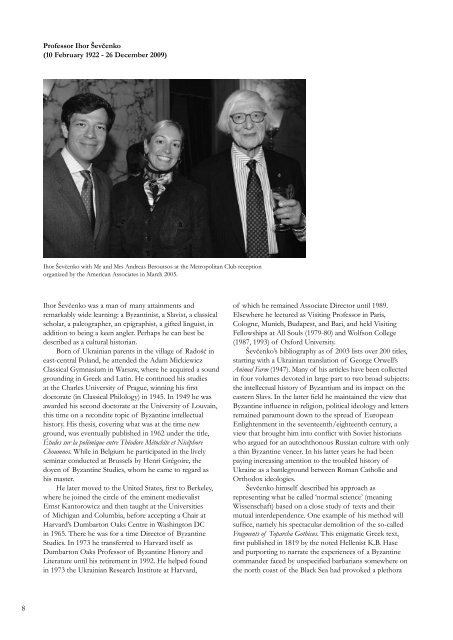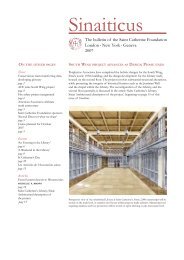Sinaiticus - Saint Catherine Foundation
Sinaiticus - Saint Catherine Foundation
Sinaiticus - Saint Catherine Foundation
You also want an ePaper? Increase the reach of your titles
YUMPU automatically turns print PDFs into web optimized ePapers that Google loves.
8<br />
Professor ihor Ševcenko<br />
(10 February 1922 - 26 December 2009)<br />
Ihor Ševcenko with Mr and Mrs Andreas Beroutsos at the Metropolitan Club reception<br />
organized by the American Associates in March 2005.<br />
Ihor Ševcenko was a man of many attainments and<br />
remarkably wide learning: a Byzantinist, a Slavist, a classical<br />
scholar, a paleographer, an epigraphist, a gifted linguist, in<br />
addition to being a keen angler. Perhaps he can best be<br />
described as a cultural historian.<br />
Born of Ukrainian parents in the village of Radosc in<br />
east-central Poland, he attended the Adam Mickiewicz<br />
Classical Gymnasium in Warsaw, where he acquired a sound<br />
grounding in Greek and Latin. He continued his studies<br />
at the Charles University of Prague, winning his first<br />
doctorate (in Classical Philology) in 1945. In 1949 he was<br />
awarded his second doctorate at the University of Louvain,<br />
this time on a recondite topic of Byzantine intellectual<br />
history. His thesis, covering what was at the time new<br />
ground, was eventually published in 1962 under the title,<br />
Études sur la polémique entre Théodore Métochite et Nicéphore<br />
Choumnos. While in Belgium he participated in the lively<br />
seminar conducted at Brussels by Henri Grégoire, the<br />
doyen of Byzantine Studies, whom he came to regard as<br />
his master.<br />
He later moved to the United States, first to Berkeley,<br />
where he joined the circle of the eminent medievalist<br />
Ernst Kantorowicz and then taught at the Universities<br />
of Michigan and Columbia, before accepting a Chair at<br />
Harvard’s Dumbarton Oaks Centre in Washington DC<br />
in 1965. There he was for a time Director of Byzantine<br />
Studies. In 1973 he transferred to Harvard itself as<br />
Dumbarton Oaks Professor of Byzantine History and<br />
Literature until his retirement in 1992. He helped found<br />
in 1973 the Ukrainian Research Institute at Harvard,<br />
of which he remained Associate Director until 1989.<br />
Elsewhere he lectured as Visiting Professor in Paris,<br />
Cologne, Munich, Budapest, and Bari, and held Visiting<br />
Fellowships at All Souls (1979-80) and Wolfson College<br />
(1987, 1993) of Oxford University.<br />
Ševcenko’s bibliography as of 2003 lists over 200 titles,<br />
starting with a Ukrainian translation of George Orwell’s<br />
Animal Farm (1947). Many of his articles have been collected<br />
in four volumes devoted in large part to two broad subjects:<br />
the intellectual history of Byzantium and its impact on the<br />
eastern Slavs. In the latter field he maintained the view that<br />
Byzantine influence in religion, political ideology and letters<br />
remained paramount down to the spread of European<br />
Enlightenment in the seventeenth/eighteenth century, a<br />
view that brought him into conflict with Soviet historians<br />
who argued for an autochthonous Russian culture with only<br />
a thin Byzantine veneer. In his latter years he had been<br />
paying increasing attention to the troubled history of<br />
Ukraine as a battleground between Roman Catholic and<br />
Orthodox ideologies.<br />
Ševcenko himself described his approach as<br />
representing what he called ‘normal science’ (meaning<br />
Wissenschaft) based on a close study of texts and their<br />
mutual interdependence. One example of his method will<br />
suffice, namely his spectacular demolition of the so-called<br />
Fragments of Toparcha Gothicus. This enigmatic Greek text,<br />
first published in 1819 by the noted Hellenist K.B. Hase<br />
and purporting to narrate the experiences of a Byzantine<br />
commander faced by unspecified barbarians somewhere on<br />
the north coast of the Black Sea had provoked a plethora



